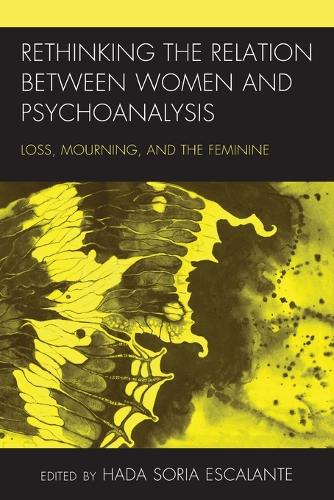
Rethinking the Relation between Women and Psychoanalysis: Loss, Mourning, and the Feminine
(Paperback)
Available Formats
Publishing Details
Rethinking the Relation between Women and Psychoanalysis: Loss, Mourning, and the Feminine
By (Author) Hada Soria Escalante
Contributions by Anglica Toro Cardona
Contributions by Paola J. Gonzlez Castro
Contributions by Marilyn Charles
Contributions by Hada Soria Escalante
Contributions by Mario Orozco Guzmn
Contributions by Carolina Koretzky
Contributions by David Zachary Hafner
Contributions by Shalini Masih
Bloomsbury Publishing PLC
Lexington Books
31st December 2021
United States
Classifications
Professional and Scholarly
Non Fiction
155.333
Physical Properties
Paperback
196
Width 154mm, Height 219mm, Spine 15mm
299g
Description
Rethinking the Relation between Women and Psychoanalysis: Loss, Mourning, and the Feminine uses contemporary psychoanalytic views to resituate women as desiring subjects within the psychoanalytic narrative. Contributors to this edited collection explore the various configurations of mourning, pain, regret, and grieving in diverse societies and cultures in order to reconstruct the role of women in modern psychoanalysis. They raise questions about the status of women in culture and society and contend with themes that psychoanalysts have associated with women since the late nineteenth century, such as loss and mourning, femininity and motherhood, and desire and sexuality. This book is recommended for students and scholars of psychology, gender studies, cultural studies, literature, and philosophy.
Reviews
Editor and contributing author Escalante (Univ. of Monterrey, Mexico) has organized this collection around the themes of subjectivity, the feminine, loss, violence, and mourning, to include essays by herself and seven other psychoanalysts of international background and experience, from Delhi to Paris, with some contributions from others within her local institution. Each essay takes a different arresting angle, addressing a range of proposals, such as, what does psychoanalysis owe to women, freed from phallocentricity; what is the relation between woman's abjection and her community role in death; what happens to femininity after a woman gives birth and becomes a mother. . . The overall aim of the volume is to support the female subjective voice. There are clinical vignettes aplenty. Many references to Freud, Lacan, Laplanche, and Bion are found, and Kristeva is aptly represented. . . the originality of the ideas is stimulating and thought provoking. Although this book is not for lay readers, the text warrants close study and will enrich mainly graduate students and others who either study or seek to apply psychoanalysis in their own practice. Summing Up: Recommended. Graduate students through faculty; professionals.
* Choice *Rethinking the Relation between Women and Psychoanalysis shows the fundamental complexity of the relationship between loss, mourning, grief, and femininity. It is an indispensable tool in order to think about a womaens position nowadays. Editor Hada Soria Escalante and the contributors have made an extraordinary work. It This book brings variety and innovation to the subject of loss and femininity that is very useful, especially for those who are interested in the clinical practice and the investigation of the contemporary psychoanalysis. -- Adriana Bauab, Freudian School of Buenos Aires
The contributors to Rethinking the Relation between Women and Psychoanalysis have abelong to diverse cultural belonginges, and their different orientations offer an interesting contrast toin the study of mourning. The study of mourning is very important in a global social context that tends to deny the lack or to correct it with merchandises. -- Araceli Coln, Universidad Autnoma de Quertaro
Author Bio
Hada Soria Escalante is researcher and professor at the University of Monterrey and clinical psychologist.
